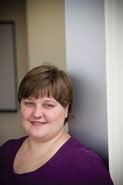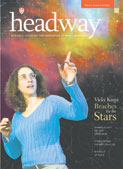In Focus
Wendy Brett: De Molière à McGill

Wendy Brett assists first-year francophones through Student Services
Claudio Calligaris
Wendy Brett: De Molière à McGill

Wendy Brett assists first-year francophones through Student Services
Claudio Calligaris
More than most, Wendy Brett draws on her own life experience to perform her job. Brett is a 32-year-old from Vancouver who works as assistant for francophone students in the First-Year Ofice, Student Services.
Hailing from a province where only 2 percent of the population speaks French as their native language, Brett has dedicated years to mastering la langue de Molière and is equally at ease conversing with Great Britons or Gaspésiens. Now, she works with first-year francophone students, providing them with the information and support that allows them to feel part of McGill.
"This position was created five years ago as the university saw a need to have a resource person for francophone students," says Brett. "We pride ourselves on giving correct information and ending the 'bounce around'."
Her role includes letting francophone students know their rights, which include writing papers and exams in French, as well as familiarizing them with services and extra-curricular activities that can enrich their campus experience. Brett also organizes two Journées d'Accueil which are attended by hundreds of new arrivals.
It is not uncommon for her to encounter new or prospective students who are anxious about how they will adjust in a new linguistic milieu. Many francophones also wonder how they will be perceived by professors and classmates.
Brett can relate. After obtaining a BA in French literature from the Universtiy of British Columbia, she decided to move to Quebec to discover how what she had learned would apply in everyday life. What she found was a challenge. Living in the northern town of La Tuque for a year, Brett quickly learned that four years of novels and grammar lessons were not a substitute for practical experience.
"School wasn't a problem. It's when you start to get into cultural situations and everyday life that challenges emerge. The experiences that I've had integrating into an area where I was a minority, those experiences were valuable."
Among Brett's real life French lessons was an eight-year stint at a Montreal plumbing company where she was the only anglophone in an organization that prided itself on being pur et dur. In her role at McGill, she draws on the insights she obtained to make new francophone students at ease and to reflect on ways to encourage them to integrate into campus life. So what has Brett learned from her experience as a front-line contact for McGill's French community?
"Well, they don't attend Discover McGill," she laughs. "Francophone students come to McGill because of its reputation. Over and over they say it's because of the prestige associated with the school. And they want to see beyond what the French language limits them to."
Brett also knows a number of tidbits about the student francophone population of which many at McGill may not be aware. For instance, she notes that certain faculties, such as engineering and nursing, have a very high proportion of francophones and that many of these students are preparing to move to Calgary.
The francophone fact is not just work-related for Brett. In her personal life, she continues to make an effort to enjoy the culture and language, living in a predominantly French neighbourhood so as to "make that connection."
Will she ever return to Western Canada? Brett is not sure, but for now she loves her Montreal life where she enjoys sports, volunteering, the piano and Alouettes games. And she would be sad to part after having successfully worked to fulfill a longtime ambition.
"I'm totally bilingual. It is possible — you just have to keep working at it."
New publications hit the university stands

Pointing the way: Headway sheds light on new research
Courtesy of Headway
In a university as big as McGill, it's easy to be confined to your own bubble and to forget about the wider community. The august paper you hold in your hands (or read on the web) is one way to have a better grasp of the myriad stories around you. Started in 1969, the McGill Reporter is the university's staff and faculty newspaper.
But there are others. The electronic newsletter that launched in the summer, Voilà McGill, sends informative nuggets and interesting tidbits to you via alnotes, the email listserv of all McGill employees. And the communications office is co-launching more vehicles for McGill to learn about itself, with versions in French and English.
Headway magazine is the spiffy new publication dedicated to researchers at McGill, brought out by the Vice-Principal Research Office, co-edited by Vice-Principal Research Office manager Jennifer Towell and communications director in the Office of the Associate Vice-Principal of Communications, Susan Murley. Headway will come out twice a year (in French as En Tête), and is distributed to all tenure and tenure-track professors, as well as to each department, school and dean's office. The inaugural issue is available now and in it you'll find stories on skateboarding's connection to Shakespeare; kids, culture and depression; and peace resolution in the Middle East.
Jennifer Robinson, associate vice-principal of communications, says, "There are so many exciting things happening at McGill, research achievements of all kinds by students faculty and staff. To tell these great stories we need great publications and that's what we're working to produce."
Also hot off the presses is the Portrait of Private Giving, coordinated with Development and Alumni Relations. It's been some years since the university has published a report on private giving, and this year it was time to bring back the format and give it a fresh approach. It will be distributed with the next issue of the McGill News.
"We decided to tell the story of the impact of giving," Robinson said. "It's important that donors fully understand that each gift we receive at McGill, no matter what the size, is important."
The report features people like Evelyn Case who has given a little something each year for 50 years, as well as Seymour Schulich, the exceptional benefactor of McGill's Schulich School of Music. Students, parents, staff, faculty — even unsung anonymous donors — all give to McGill, which is crucial to the university in stuff and spirit.
"Public funding enables us to be an excellent university. The private giving helps the university to go to the next level," Robinson says.
As well, if you're curious about the range of expertise at McGill, consult our updated media guide online at www.mcgill.ca/mediaguide. Robotics, taxation, meteorology — the scope is all encompassing.
Finally, the Facts Brochure is coming out soon, a handy-dandy all-purpose guide to the university. Just how many faculties and schools are there?1 What the heck's a martlet, anyway?2 How many residence spaces are there?3 (See answers below.) The curious-minded can learn even more about their university in a few short weeks when the brochure will be available at departments all around campus.
To see the online version of Headway, go to www.mcgill.ca/headway for the English version and francais.mcgill.ca/headway for the French.
1 21
2 a mythical bird that's perpetually in flight
3 2,400

